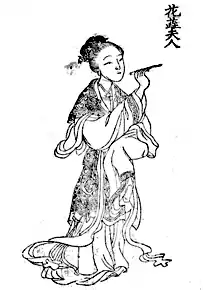| Madame Huarui | |||||||||||
|---|---|---|---|---|---|---|---|---|---|---|---|
 An illustration from a Chinese book named as 《百美新詠圖傳》 | |||||||||||
| Chinese | 花蕊夫人 | ||||||||||
| Literal meaning | Lady Flower Bud | ||||||||||
| |||||||||||
Consort Xu (徐惠妃) (c. 940 – 976) was a concubine of Later Shu's emperor Meng Chang during imperial China's Five Dynasties and Ten Kingdoms period. More commonly known as Madame Huarui (花蕊夫人), she was also a notable poet.
When Emperor Taizu of Song defeated Meng Cheng, Madame Huarui was captured. Emperor Taizu had heard of her fame as a poet and asked her to compose a poem for him. Madame Huarui immediately sang (as translated by Anthony C. Yu):[1][2]
| 君王城上竪降旗 | The king on the rampart flies the white flag. | |
| 妾在深宮那得知 | Deep within the palace how could I know? | |
| 十四萬人齊解甲 | One hundred forty thousand all disarmed! | |
| 更無一個是男兒 | Among these was there not a single man? |
References
- ↑ Quan Tangshi, ch. 798.
- ↑ Chang & Saussy, p. 85.
Sources
- (in Chinese) Quan Tangshi (全唐詩) [Complete Tang Poems]. 1705.
- Chang, Kang-i Sun; Saussy, Haun, eds. (1999). Women Writers of Traditional China: An Anthology of Poetry and Criticism. Stanford University Press. ISBN 0-804-73231-0.
- Rexroth, Kenneth; Chung Ling (1972). The Orchid Boat: Women Poets of China. New York: McGraw-Hill Book Company. ISBN 9780070737440.
- "Huarui Furen", Mountain Songs, last accessed June 8, 2007
External links
This article is issued from Wikipedia. The text is licensed under Creative Commons - Attribution - Sharealike. Additional terms may apply for the media files.